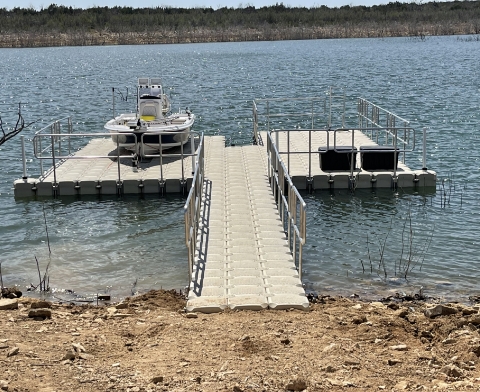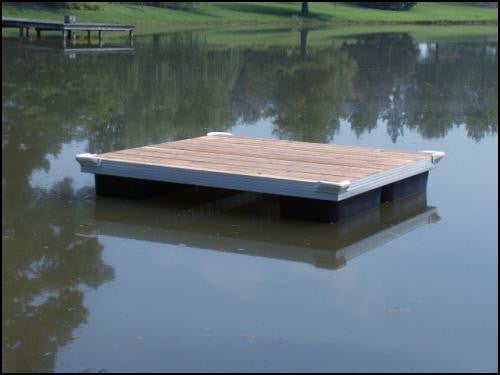How to Select the Right Floating Dock Builder for Your Customized Dock Requirements
Why Floating Docks Are the Perfect Solution for Your Waterside Requirements
Floating docks existing a compelling remedy for waterfront requirements, particularly due to their versatility to rising and fall water degrees and their durable, modular design. As we explore the multifaceted benefits and applications of floating docks, it comes to be obvious why they stand out in the world of waterside facilities-- particularly when considering the lasting benefits they give for various stakeholders.
Trick Advantages of Floating Docks
The flexibility of floating docks deals many benefits for beachfront applications, making them an increasingly prominent selection among marina operators and residential property developers. One of the primary advantages is their versatility to varying water degrees, which allows them to continue to be functional in numerous atmospheres, consisting of lakes, rivers, and seaside locations. Unlike typical set docks, floating docks can fluctuate with the trends and seasonal modifications, making sure constant access.
In addition, floating docks are usually easier and less costly to maintain and install. Their modular style helps with fast setting up, minimizing labor costs and building and construction time. Furthermore, the products used in floating dock building and construction are frequently immune to corrosion, ensuring longevity with marginal maintenance.
Security is another essential benefit; the buoyant nature of these docks decreases the risk of accidents during boarding and disembarking, making them especially appealing for family-oriented centers. Their environmental effect is reduced than that of set frameworks, as they do not interrupt water ecosystems. Jointly, these advantages setting floating docks as a remarkable remedy for a variety of waterside requirements, aligning with both operational effectiveness and eco-friendly considerations.
Ideal Applications for Numerous Tasks
Flexibility is a hallmark of floating docks, making them ideal for a large range of activities across different waterside settings. These flexible frameworks can function as excellent platforms for recreational activities such as boating, fishing, and swimming. Their resilient nature enables for easy access to watercraft, making it possible for smooth departure and disembarkation, while likewise providing a stable location for anglers to cast their lines.
In industrial settings, floating docks promote the loading and dumping of items, fitting both little and large vessels. They are specifically valuable in areas with changing water degrees, guaranteeing that procedures continue to be nonstop. Additionally, floating docks can be used for waterfront dining and entertainment, giving a beautiful and distinct experience for patrons.
Ecological applications are also remarkable; floating docks can operate as monitoring platforms for wild animals watching or as docking terminals for research vessels participated in eco-friendly research studies. As marina developments end up being a lot more prevalent, these docks provide a functional option for boosting ability without considerable land modifications. Eventually, the versatility of floating docks makes them a recommended choice for anyone seeking useful and effective beachfront services.
Design and Personalization Options
Floating docks not just provide to diverse activities however additionally supply a series of layout and modification choices that improve their performance and aesthetic charm. These flexible frameworks can be customized to fit details waterfront needs, whether for household, business, or recreational purposes.
One secret element of modification is the choice of products. Choices range from high-density polyethylene to aluminum, each offering special advantages in regards to longevity and upkeep. Furthermore, the setup of the dock can be adapted to match different water degrees and ecological conditions, ensuring security and security.
Layout functions can consist of integrated seating, barriers, and lights, which not only improve usability however also improve the appearance of the dock. Personalized colors and coatings enable proprietors to match the dock with existing frameworks or individual preferences, producing a cohesive seek the waterside.
Furthermore, floating docks can be made with modular sections, enabling simple expansion or reconfiguration as demands alter. This adaptability is particularly beneficial for growing households or progressing business. Generally, the comprehensive style and customization alternatives available make floating docks an extremely versatile option for any waterside setting.
Installment and Upkeep Factors To Consider
Generally, successful installation and maintenance of floating docks require careful preparation and focus to detail. Before starting installment, it is necessary to assess the certain website problems, consisting of water deepness, wave action, and local policies. This initial assessment educates the selection of materials and layout, making sure the dock will endure environmental tensions.

Maintenance is equally crucial to prolong the life-span of the dock. Regular inspections should be performed to identify damage, particularly on flotation protection devices, connectors, and decking. Cleaning the dock periodically helps stop the build-up of algae and particles, which can jeopardize surface stability and appearances.
Additionally, seasonal preparations, such as eliminating devices and securing the dock during severe weather, can protect against damage. By prioritizing appropriate installation and routine maintenance, owners can ensure their floating dock remains a useful and reliable waterfront option for many years to come.

Ecological Impact and Sustainability
The ecological influence of floating docks is a vital consideration for waterside jobs, as these structures communicate directly with marine ecological communities. floating dock builder. Unlike traditional fixed docks, floating docks decrease disruption to the substratum, enabling all-natural debris activity and decreasing erosion. Their layout permits water circulation underneath, advertising healthy and balanced water atmospheres and sustaining neighborhood wild animals
Several floating docks are created from lasting products, such as environmentally friendly composites and recycled plastics, which decrease the carbon footprint connected with manufacturing. Moreover, modern-day designs incorporate features that boost ecological sustainability, such as permeable surfaces that facilitate water filtration and minimize pollution.
Floating docks additionally supply an ideal system for environment remediation by sustaining the development of water vegetation and offering sanctuary for fish and other marine organisms. By including attributes like fish environments and submerged growings, floating docks can enhance biodiversity in the area.
Furthermore, these structures can get redirected here be developed to accommodate photovoltaic panels, find here giving sustainable energy options that additionally decrease their ecological effect (dock company). In general, floating docks stand for a sustainable remedy that balances human use of beachfronts with the preservation of essential ecological communities
Conclusion
Finally, floating docks present a very adaptable and lasting remedy for diverse waterside requirements. Their modular style, coupled with using durable, corrosion-resistant materials, ensures long life and convenience of upkeep. The adaptability of floating docks suits numerous applications, varying from leisure activities to business procedures while lessening environmental impact. Inevitably, the personalized functions and capacity for expansion more solidify floating docks as a suitable option for any beachfront job.
Floating docks present an engaging option for waterfront needs, specifically due to their versatility to varying water degrees and their durable, modular design. Unlike typical fixed docks, floating docks can increase and fall with the tides and seasonal adjustments, making sure constant accessibility.
Collectively, these benefits setting floating docks as a remarkable solution for an array of waterfront demands, aligning with both functional efficiency and environmental factors to consider.
In general, the considerable design and modification options readily available make floating docks a very adaptable option for any kind of waterfront setting.
Unlike typical fixed docks, floating docks decrease disruption to the substrate, enabling for all-natural sediment movement and minimizing disintegration.